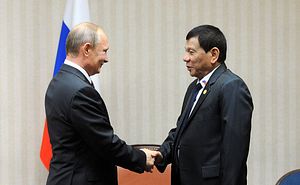Last month, the Philippines and Russia held another round of consultations between their national security establishments. The consultations spotlighted the ongoing status of a mechanism that is one of several that have emerged amid the boost for ties under Philippine President Rodrigo Duterte’s foreign policy.
As I have observed previously in these pages and elsewhere, one of the consequences of Duterte’s so-called independent foreign policy, which seeks to boost the country’s outreach with countries like China and Russia, has been the slow but sure development of Russia-Philippine defense relations, despite the challenges that still exist.
That has continued on into 2019 as well through a series of interactions. These include naval visits, continuing discussions about new security-related pacts, the exchange of maritime equipment and expertise, and trips between officials tied to broader developments including conferences and security consultations.
Among the newer security links set up by the two sides early on hand been talks held between the Philippines’ National Security Council (NSC) and Russia’s Security Council (SCRF). The first iteration of those talks was held in Davao City on February 2017, and the second was held in Moscow in May 2018, in line with the initial objective by both sides to annualize the mechanism as an institutionalized part of the security aspect of the relationship.
On June 21, this manifestation of the security relationship was in the spotlight again as both countries held the third round of their NSC-SCRF consultations. The talks were headed by National Security Adviser and Director General of the NSC Secretary Hermogenes C. Esperon Jr. and head of the SCRF Nikolay P. Patrushev.
During the discussions, both sides discussed the state of their bilateral collaboration as well as exchanged views on regional and international issues. Per Esperon, in addition to following up with existing agreements in areas such as intelligence exchange, counterterrorism, and drug trafficking, new avenues for cooperation were pursued including dialogues, information sharing, and capacity-building. Esperon was accompanied by a Philippine delegation that also involved officials from the Justice Department, the Coast Guard, the National Intelligence Coordinating Agency, and the Philippine National Police.
Apart from the NSC-SCRF talks, Esperon also participated in other defense-related interactions as well. These included the 10th Meeting of High-Level Officials Responsible for Security Matters held in the City of Ufa, Russia from June 18-20, where discussions focused on areas including hybrid threats and cooperation in humanitarian assistance and disaster relief.
































